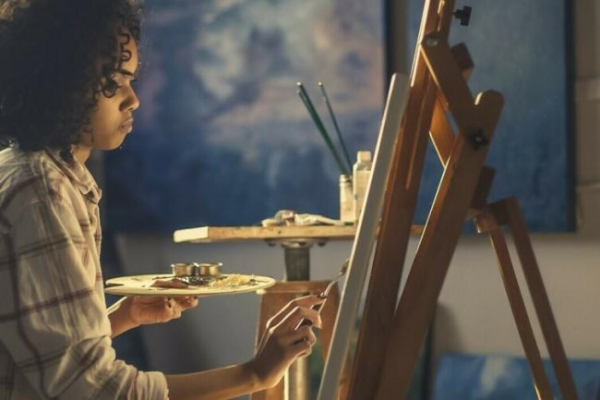
Hobbies are a fundamental aspect of human existence, revealing a source of inspiration, pleasure and creative self-realization.
Their roots go back to ancient times, as far as the birth of civilization itself. The variety of hobbies is almost endless, but their essence is always the same – to give a person a chance to escape from the routine of everyday duties, express their individual interests and quench the unquenchable thirst for creativity.
Hobbies are essentially an expression of existential freedom, giving a person the opportunity to find meaning in their actions, satisfy their inner need for self-expression, and fill their lives with significance. Hobbies allow an individual to step away from the burdens of mortal existence, give themselves a break from the world of the “here and now,” and immerse themselves in the object of their passion, thus affirming their subjectivity.
Let's delve deeper into how hobbies came to be, why they have become an integral part of our lives, and what impact they have on our well-being. After all, every aspect of our hobbies is another step towards understanding the meaning of our own existence and the key to the door that leads to a more meaningful and fulfilling life.
The origins of what we call a hobby today are lost in the shadows of antiquity. A person surrounded by the cruel necessity of survival, thrown into the world of hunting, gathering, farming, still somehow miraculously found a way to the unnecessary, to the superfluous, but at the same time to the truly human. This is the paradox of our freedom: even being constrained by the conditions of existence, a person is able to go beyond them.
It is then, in the unimaginable heaviness of primitive life, that the spark of what we can call free activity first appears. Look at the walls of primitive caves. These drawings, the hieroglyphs of emotions, were not dictated by utilitarian needs. These are not just hunting maps or magical amulets. Before us is a gesture of testimony, an attempt to leave a trace of oneself, to declare one's “I” in the surrounding chaos. This is an artistic challenge to a life in which there is nothing but the struggle for tomorrow.
Or take the ancient necklaces made of fangs and shells. They convey something more than just a desire to adorn oneself in the eyes of another. They express a desire to be not just a creature in nature, but a creature endowed with meaning, value. In creating these ornaments, man looked into the face of the absurd – the merciless emptiness of the world – and created meaning where there was none.
With the development of human civilization, this craving for the meaningless, as it might seem, became more and more sophisticated. In the gardens of Ancient Egypt, behind the skillfully composed collections of Greek sculpture, in the performances of the Roman Colosseum, the same existential motive is felt: the world subjugates us to necessity, but we resist, we create a space of freedom.
Hobbies are not just a story of leisure. They are a story of man's struggle with existence itself, which is forever captivated by his need to live. By creating for the sake of aesthetics, beauty, and play, he breaks away from the everyday for a moment, striving for real freedom – even if it is illusory.
In the Middle Ages, when the world was consumed by endless wars and the struggle for survival, a hobby became almost the only space for expressing inner freedom, although even here a person, being in the chains of his time, faced necessity.
The knights, elevating their tournaments and battles to the rank of a sacred game, seemed to be looking for in this not just proof of strength, but perhaps some desperate desire for self-knowledge , for oneself, in these duels on which not only their honor depended, but also their existence in the world.
Hunting and music became consolations, though they too, filled with cultural symbols, remained only broken reflections of deeper searches. But even among the common people, in their daily routine, when every moment was subordinated to the brutal struggle for daily bread, creativity broke through the cracks of tired lives.
Songs, baskets (basket weaving), crosses (cross-stitching) – all this was not so much an expression of aesthetic will, as a way to breathe, to live, to be alive, despite the overwhelming reality. And these crafts, which initially had a utilitarian meaning, became a kind of gesture of resistance to the world, where every functional object turned into art, where every stitch was not just a technology, but an act of liberation, even if this liberation was temporary and ephemeral.
When the Renaissance arrived, an era that gave man the illusion of breaking away from the burdensome existence, the hobby acquired a new scale. Having escaped from the prison of religious domination, man began to look for his place, his meaning in art and science. Collecting, literature, music – all this became not just a hobby, but a way of asserting oneself, confirming one's autonomy in a world that had become even more complex and multi-valued.
The invention of printing, like the very appearance of printed words, was not just a technical advance, but an act of liberation of thought, perhaps even a revolution of the spirit. In this new world, where everyone could touch books, creativity, a new era of hobbies opened up – hobbies as a form of finding meaning, as philosophy, where art, through painting and sculpture, became not just a way of transmitting aesthetic values, but a search for existence, a search for freedom itself, in which a person could find his “I”.
The Industrial Revolution pushed man into a new plane, becoming an era when machine production suddenly threw the weightless dust of time onto the hardships of physical labor. Freed from the immediate, painful need to fight for survival, man faced a void where the meaningfulness of existence required new forms.
This is how a passion, a hobby was born – not escapism, but an attempt to re-live oneself in a world that has ceased to be natural.
- Collecting is a gesture of striving for meaning: the collector of a stamp or coin contemplates his collection as if the truth of existence were hidden in it, each detail a part of his personality, desperately searching for itself.
- Gardening is a paradoxical rebellion against urban mechanics, a return to nature through the artificial formation of its fragments.
- Music, with its harmonies and dissonances, fills the gaping hole that technology has left in the human soul.
- And even tourism, opened up by the steel dragons of the railways, becomes a metaphysical escape from one void to another, a movement not so much in space as in oneself.
All this is the new essence of leisure, that very slippage between man and time, an attempt not to disappear into the endless mechanistic nature of the industrial era.
In the 20th century, when human life lost its primeval primitiveness, hobbies became not just passions, but rather a given, conditioned by changes in the structure of existence. The reduction of working hours and the growth of material wealth offered the individual, freed from the struggle for survival, a new space for the manifestation of his free will.
Man has begun to manage time, which was previously subject to the cruel laws of labor. And now hobbies are beginning to surface as living evidence of the possibility of choice, expanding the horizons of existence . Sports, photography, modeling, cooking – all these are not just forms of leisure, they are a way of overcoming one's very nature, its limitations. After all, human life has always been more or less tied to such burdensome canons as work, money and social norms. And now people are beginning to see freedom through camera lenses, under the pressure of the camera or in the chilling speeds of sports competitions.
However, the unconditional triumph in the evolution of hobbies is the culture of media entertainment: cinema, radio, television. These artificial worlds are illusions, contours of reality, but in these worlds we see and feel what we could never experience in our own existence.
A special place in this series is occupied by technological innovations, which have also penetrated the sphere of leisure. Video games, computers, the Internet – each of these phenomena offers a new way of being, a different way of experiencing one's essence. We no longer simply react to the world, we create it, interact with it. And in this process, man perhaps finds the purest path to self-expression – in the search for meaning, which, as it seems to us, we can invest in virtual worlds, as in endless canvases of artists.
But why do people do this? A hobby is a form of resistance. It is a psychological release from the endless pressure of the outside world, an opportunity to break out of the daily routine, to dissolve anxiety in creating something of our own. In these activities, we may not just find satisfaction, but also free ourselves from what limits us. We ourselves are like creators. Creative realization is not just a process, but a way of looking at the world: through a hobby, we open up new horizons for ourselves, search for meanings, and experience streams of emotions.
There is another paradox: every moment devoted to a hobby not only brings calm, but also reproduces happiness. After all, every successful completion of an activity, whether it is writing a blog or winning a sports game, causes the production of endorphins. A person suddenly feels that he, in this moment of his being, lives fully, goes into the joy of life.
And the social aspect itself is no less important. A person involved in his hobby finds new people, and this, in turn, creates a community of like-minded people, as if involved in his personal history. And in this gathering of equally passionate individuals, a person feels part of something greater than just a momentary act of pleasure.
However, a hobby should not be perceived only as a way to relax, to an exciting process of self-expression. It is also a way to master new skills, fine work with motor skills, abilities or physical endurance. In the very mastering of something new, there is a new form of growth, an independent exit beyond the limits of “normal” existence, when you become someone you have not yet been, develop beyond the obvious.
Without a hobby, existence begins to lose its colors and flow into hopeless monotony. The absence of hobbies, paradoxically, leads to disappointment, to a mood of hopelessness and emptiness . It is important for a person to feel alive, truly happy, so that his existence gains significance and fullness. Without a hobby, something in a person’s inner world fades away, is not filled with even illusory, but joy.
Hobbies perform their most important function – they save us from emotional burnout where ordinary life proves powerless. How a person becomes a being is reflected in his desire to overcome loneliness. Especially in the final chord of life, in old age.
Engaging in a hobby creates something great: it activates our mind, allows us to learn new things. After all, every moment spent on something interesting to us not only gives meaning, but also becomes a goal in the everyday routine. Finding this meaning of an answer in everyday life is one of the most important tasks of existence.
Hobbies have accompanied humanity throughout history, reflecting the never-ending quest for self-expression and the search for pleasure. In today's world, hobbies play an increasingly important role in the lives of millions of people. They fill our days with meaning, help us cope with challenges, and maintain harmony between continuous work and much-needed rest.
Once you find something that brings you joy, recognize every moment of your passion as a given of your freedom, as proof that you are living and not someone else is living for you.





